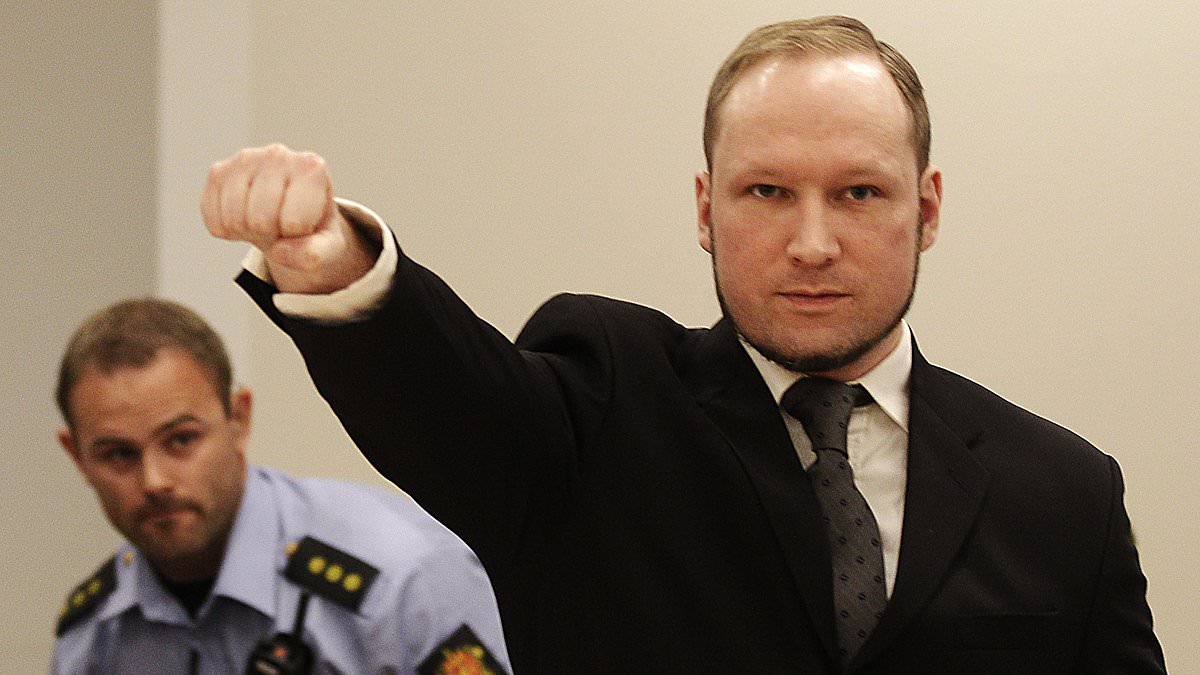Neo-Nazi killer Anders Breivik who applied for parole just 13 years after killing 77 people in twin attacks will remain behind bars, despite the court noting positive changes.
A Norwegian court Wednesday rejected parole for the right-wing extremist Anders Behring Breivik, 45, with his lawyer claiming it was ‘not a surprise’.
Oystein Storrvik said the decision to reject conditional freedom for Breivik was a predictable outcome, regardless of the fact the court did recognise ‘positive evolutions’ for his client.
On July 22, 2011, Breivik set off a truck bomb near government offices in Oslo, killing eight people, before heading to the island of Utoya.
There, disguised as a police officer, he shot dead 69 people, mostly teens, attending a Labour Party youth-wing summer camp.
He said he had killed his victims because they embraced multiculturalism.
Breivik was sentenced in 2012 to 21 years in prison, which at the time was Norway’s harshest sentence.
But the sentence can be extended as long as he is considered a threat to society.
Breivik asked for parole for the second time on November 19 where he vowed to be a ‘tremendous help to the Norwegian state’ if his request was to be granted.
Under Norwegian law, the extremist is allowed to seek conditional early release once a year after having served 10 years of his sentence.
His first parole request in January 2022 was denied, with the court concluding there was a ‘clear risk’ he would resume the behaviour that led to the July 22 2011 attacks.
His lawyer also told reporters his request this time was ‘not so probable.’
Breivik, who has used his previous court appearances to express extremist views, appeared last month wearing a black suit and tie and carrying a sign with several political messages.
In a brief statement to reporters before proceedings got underway, Breivik said: ‘If I am given an exit opportunity in the future, I will be a tremendous help to the Norwegian state, and that’s something I take very seriously.’
‘Alternatively, I can keep my mouth shut for the rest of my life. But that’s up to the judge.’
Asked by a reporter whether he regretted his 2011 actions, Breivik replied: ‘I will talk about that in my explanation.’
Storrvik said: ‘We want the court to consider his progression, he has a right to… develop and have better living conditions so he can have some kind of future.’
In February 2024, Breivik lost a lawsuit brought against the Norwegian state in which he argued that his extended isolation was a violation of the European Convention on Human Rights, which prohibits ‘inhumane’ and ‘degrading’ treatment.
The state argued that his strict, yet comfortable, conditions were justified due to the ‘extreme risk of totally unbridled violence’.
Storrvik said external psychologists had conducted a comprehensive evaluation of Breivik for the first time in 12 years, and would present their 109-page report to the court.
The lawyer declined to disclose its conclusions but said: ‘I think it can be useful for us.’
Prosecutor Hulda Olsen Karlsdottir told news agency NTB the report had not changed her mind.
‘The new evaluation has not changed the prosecution’s view on the issue of his release,’ she said.
During court hearings earlier this year, Breivik claimed he was depressed and addicted to Prozac, at times breaking down in sobs.
